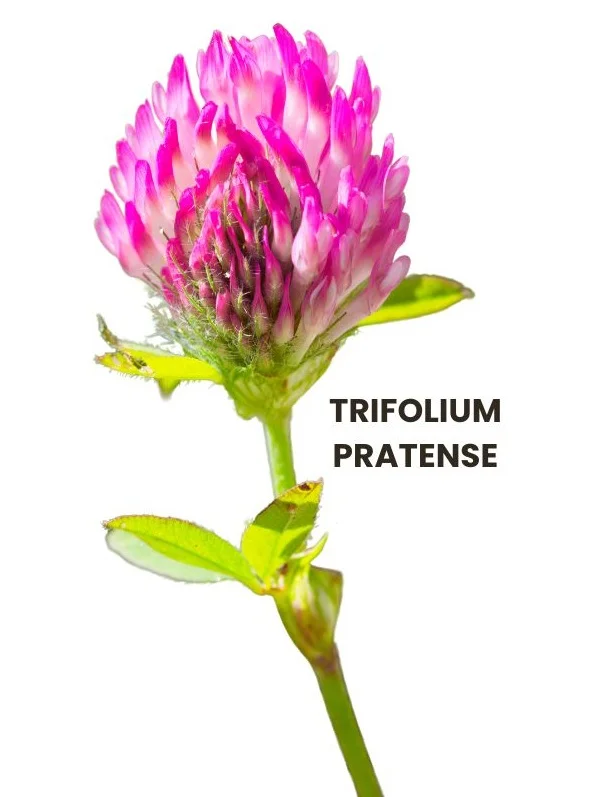Trifolium Pratense, commonly known as Red Clover, is a well-known homeopathic remedy derived from the Red Clover plant.
It is particularly noted for its ability to stimulate the salivary glands, causing excessive salivation, and is beneficial for treating hay fever, whooping cough, and throat afflictions.
It is also valuable in cases involving stiff neck, mental confusion, and cancerous diathesis.

Table of Contents
ToggleSOURCE INFORMATION
Scientific Classification
- Kingdom: Plantae
- Order: Fabales
- Family: Fabaceae
- Genus: Trifolium
- Species: Trifolium pratense
Origin and Historical Use
- The Red Clover plant is native to Europe, Asia, and northwest Africa.
- It has long been used in herbal medicine for its anti-inflammatory and detoxifying properties, especially for respiratory issues and skin conditions.
- In homeopathy, it is noted for its ability to treat salivary gland disorders and hay fever, as well as chronic coughs.
DRUG PATHOGENESIS
- The remedy works primarily on the glands and respiratory system, particularly the salivary glands, leading to increased saliva production.
- It is effective for hay fever, whooping cough, and mumps-like symptoms.
- It also addresses stiffness in the neck and conditions with a cancerous diathesis (a predisposition to cancer).
PHYSICAL CONSTITUTION, DIATHESIS, AND TEMPERAMENTS
- Physical Constitution: Suited for individuals suffering from glandular swellings, salivation, respiratory irritation, and neck stiffness.
- Diathesis: Cancerous diathesis, indicating a predisposition to cancerous conditions and issues related to glandular congestion.
- Temperament: Best suited for individuals experiencing mental dullness, confusion, or cognitive decline.
WHAT IS CONSTITUTION IN HOMOEOPATHY?
WHAT IS DIATHESIS IN HOMOEOPATHY?
WHAT ARE TEMPERAMENTS IN HOMOEOPATHY?
KEY CHARACTERISTICS
- Produces marked ptyalism (excessive salivation).
- Congestion of the salivary glands, similar to mumps.
- Hoarseness and throat soreness.
- Useful in hay fever, coughs, and spasmodic respiratory conditions.
- Stiffness and cramps in the neck muscles.
DETAILED ORGAN SYMPTOMS
HEAD
- Confusion and headache upon awakening: Individuals may feel a lack of mental clarity, especially in the front part of the brain.
- Mental dullness and memory loss: The remedy is beneficial for mental decline, forgetfulness, and difficulty concentrating.
MOUTH
- Excessive salivation: Marked increase in the flow of saliva, often as a symptom of glandular congestion or irritation.
- Sore throat with hoarseness: The throat feels sore and irritated, making it hard to speak or swallow.
RESPIRATORY SYSTEM
- Coryza and hay fever: Thin mucus discharge from the nose, often accompanied by respiratory irritation that precedes hay fever.
- Cough: Spasmodic and choking cough, often worse at night or upon exposure to open air. Trifolium Pratense is particularly effective for whooping cough and paroxysmal coughing.
- Chills and cough: Chills accompanying the cough, especially at night, add to the respiratory discomfort.
BACK AND NECK
- Stiff neck: Cramp and stiffness in the muscles of the neck, particularly the sterno-cleido muscles. Heat and gentle irritation offer relief from this stiffness.
EXTREMITIES
- Cold hands and feet: Individuals may experience coldness in the extremities, with tingling in the palms.
- Tibial ulcers: Chronic ulcers may form along the tibia (shinbone), which can be slow to heal.
MODALITIES
- Worse: At night, in the open air, lying down, and during hay fever season.
- Better: From warmth, heat, and gentle irritation of the affected areas.
WHAT ARE MODALITIES IN HOMOEOPATHY?
RELATIONSHIP WITH OTHER DRUGS
Compare with:
- Trifolium Repens (White Clover): Useful as a prophylactic against mumps, particularly for congestion in the salivary glands.
- Symptoms include watery salivation, fear of heart stoppage, and sensation of blood in the mouth.
- Mercurius: Also known for excessive salivation.
- Syphilinum: Related to ptyalism and glandular conditions.
DOSE
- The recommended dosage is the tincture, taken in small quantities according to the practitioner’s direction.
Frequently Asked Questions
What is Trifolium Pratense used for in homeopathy?
- It is primarily used for treating excessive salivation (ptyalism), respiratory issues such as hay fever and whooping cough, as well as glandular conditions and stiffness in the neck.
Can Trifolium Pratense help with hay fever?
- Yes, it is highly effective in managing symptoms of hay fever, particularly when there is nasal discharge, respiratory irritation, and spasmodic coughing.
What is the best form of Trifolium Pratense for use?
- The tincture is most commonly used, either applied externally or taken internally, depending on the condition being treated.
Is Trifolium Pratense safe for long-term use?
- When used in homeopathic potencies, it is safe for long-term use. However, consultation with a healthcare provider is recommended.
Does Trifolium Pratense help with mental fog?
- Yes, it can be used to alleviate mental dullness, confusion, and memory loss, particularly when these symptoms are associated with glandular or respiratory conditions.
Glossary of Difficult Words
- Ptyalism: Excessive secretion of saliva.
- Coryza: Inflammation of the mucous membranes in the nose, often causing a runny nose.
- Paroxysms: Sudden, intense attacks or outbursts, typically referring to coughing or pain.
- Sterno-cleido muscles: Muscles that run from the sternum and clavicle to the mastoid process behind the ear, helping in the movement of the neck.
- Tibial ulcers: Chronic, often painful sores or ulcers located on the shinbone (tibia).
